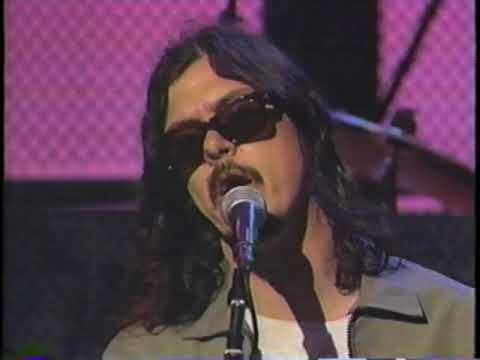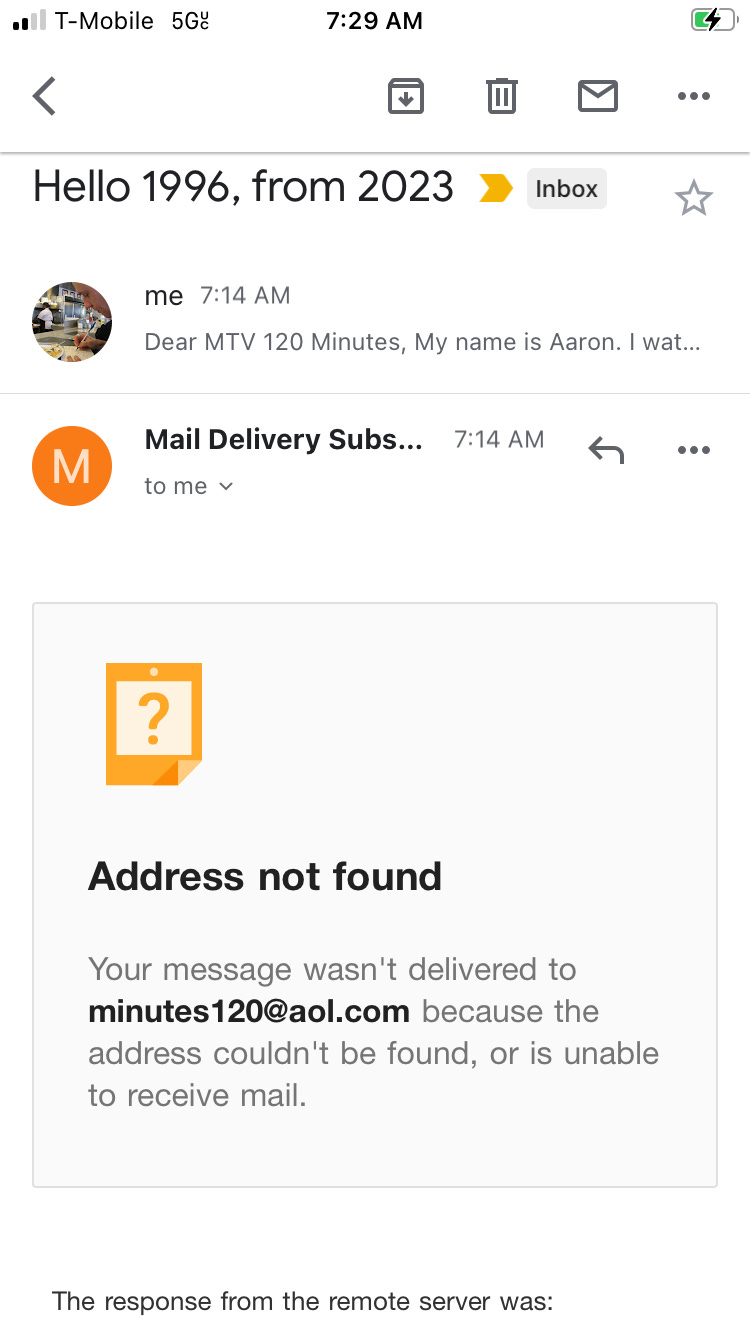When Butthole Surfers Hosted MTV's 120 Minutes and Email Was New
Emailing the alterative past from the digital future
In August 1996, the Butthole Surfers hosted MTV’s late-night alternative rock show 120 Minutes. Three members of this lysergic band introduced videos from Local H and Lifter. They lightened scripted moments with a litany of jokes, and they fielded questions from viewers who submitted them via email. Email! In 1996, email was beginning to get widely used.
Airing on MTV from 1986 to 2000, a who’s-who of bands either performed on or were interviewed on 120 Minutes: Nirvana, Beck, Sonic Youth, Violent Femmes, Smashing Pumpkins, Ween, Liz Phair, Depeche Mode, Dead Milkmen, Green Day, Jawbox, The Jesus and Mary Chain, Blur, Oasis, Cracker, Luna, Helmet, 10,000 Maniacs, KMFDM, Concrete Blonde, Kate Bush, Sarah McLachlan, Victoria Williams, Mike Ness from Social Distortion, They Might Be Giants, Rage Against the Machine, Radiohead, The Replacements, Morphine, and Lo-Fidelity All-Stars, along with one-off ’90s bands like Toadies, Bush, and Hum. To name a few, lol.
Before the internet, 120 minutes was where kids went for new music and music news. In fact, the first time Nirvana’s “Smells Like Teen Spirit” video aired on TV was on 120 Minutes.
Before the internet, kids read print music magazines like Rolling Stone, Option, and Spin. We got the free magazine Pulse! at Tower Records and looked to see what cool new albums stores had on display. Even when your older sibling fed you cool band names, to stay cutting edge, you needed cutting edge outlets. Even if MTV wasn’t as cutting edge as the clerks at your local indie record store, it was always playing new music, so you paid attention to it, if only in the background while you played Nintendo.
Apparently, MTV was cutting edge enough to invite viewers to use email, though.
Email is so widespread that it’s hard to imagine a world without it, but in 1996, it felt new. Sure, people who used the same computer system could send primitive computer-based messages to each other in the early 1960s. Many universities, government agencies, and military industries had started using during the 1980s, but it was only in the mid-1990s that email communication gained the kind of mainstream traction that eventually made it intractable with the public. When the Butthole Surfers hosted 120 Minutes in 1996, you may have had a computer lab in college and taken typing classes in high school, but computers had still not become a part of everyone’s daily lives.
As the Butthole Surfers’ drummer, King Coffey, said as host, “In this day and age, people really seem to like email.”
The other band members said, “Backslash 4,000 years into the future.”
They ran the show’s email address across the screen and invited viewers to ask “other thought-provoking questions to future hosts.” I didn’t know what an email address was until about 1997. Now I couldn’t live without one.
Rewatching this segment on YouTube in 2024 was interesting. The funniest part was when the band answered questions that viewers submitted by email.
Anyway, amid that litany of bands, a select few artists got guest host, taking 120 Minutes hosts Dave Kendall’s, Lewis Largent’s, and Matt Pinfield’s jobs for an hour.
Morphine guest hosted.
Mike Watt guest hosted.
The Beastie Boys and Henry Rollins guest hosted.
But the Butthole Surfers episode still mesmerized me.
The Butthole Surfers were one of the world’s strangest bands. Their weird wasn’t put-on. This was them. Like The Meat Puppets’ Kirkwood brothers, they came from a different planet. When my friends and I saw them play Lollapalooza in 1991, they put on a bizarre, beer-soaked show in the middle day in 100-degree heat. The memory of it seared into my brain forever. I stood at Gibby and Leary’s feet, a teenager, and watched. Naturally, they were one of the most memorable 120 Minutes hosts of all. They were weird, but they were also smart, and funny.
The first viewer email that drummer King Coffey read asked how the expansion of the universe and the Dark Matter Controversy has affected the band.
“I think simply the fact that the effects of gravity are immediate, as opposed to, light travels at a fixed rate of speed,” said guitarist Paul Leary, “has allowed the aliens to come visit us, and that’s responsible for my UFO sightings.”
“Man, all I know is that gravity is a cruel mistress,” said singer Gibby Hayes, removing his sunglasses. He ran his finger under his eyes. “Look at these bags. I’m an old, old man.”
Leary told Gibby, “Your bag is leaking, man,” and Gibby—his deadpan finally cracking into a grin—stuffed his imaginary colostomy bag back under his shirt.
Giving people this improvisational and insane a platform was brilliant. It was also risky. Who’s to say the band would stick to the cue cards MTV had written? At one point, Gibby just read the directions on the cue card: “Read and answer email.”
They managed to follow some of MTV’s directions, but they skipped a lot of the lame concocted lines and riffed instead. They were being creative. It’s what made them a great band and what made them great hosts. For as uptight and scripted as MTV could be, seeing this kind of lysergic improvisation was refreshing. Nothing required censoring or lawsuits, so it worked out.
King Coffey read another viewer question. One guy from Seattle, “the former Grunge capital of the world,” asked what they profession the band rather be in besides music.
Gibby said he’d rather be a Septathelete. “Those are the people that compete in a three-category staged event that can last anywhere from five minutes to hundreds of years,” Gibby said. “It’s where you build a canoe, sew on a button, and teach a dog to sit.” King Coffey thought that sounded like a mighty fine profession. “Yeah,” said Gibby. “You make lots of money and you get to die when you’re old.”
Gibby had appeared in the 1995 film Dead Man. His character got fellated in an alley. One viewer in South Carolina wanted to know if Gibby planned to be in any more movies.
“Well King—Paul—you know,” said Gibby, “the interesting thing about that is that Albinos actually have black skeletons. Albinoism have white skeletons, and Albinos have black skeletons.” But what about albinos with exoskeletons, Leary asked. “Exoskeleton albinoism does not exist,” said Gibby.
Leary: “Oh.”
A young woman in Connecticut wanted to know what other bands they liked.
“I listen to Cosmetic Tooth Removal,” Gibby said, “one of my favorites, and The Againsters.”
“I like The Againsters myself,” said Leary.
But what’s the difference between The Againsters and The Againsters?
“Well, the Againsters are into Warm Dwarf. And The Againsters are into Warm Dwarf. And the Againsters are into doing it again and again, and The Againsters are against everything. And Warm Dwarf…”
Gibby admitted it was a lame comedy bit. Then they introduced Patti Smith’s new video.
He seemed able to only put up with so much of this MTV stuff. Bands appeared here to promote their albums, singles, and themselves. Butthole Surfers performed two songs in MTV studio that night: “Jingle the Dog’s Collar” and “Cough Syrup,” though MTV cut off the latter prematurely. They weren’t the catchiest songs playing on MTV that year, but these were some of the catchiest, most accessible songs the Butthole Surfers ever wrote. And these live MTV versions sounded really damn good.
If this was your first encounter with the Butthole Surfers, a conventional person might wonder why MTV would give these lunatics a platform. But seeing these three nutjobs play their song “Jingle the Dog’s Collar” live should have separated the fans from the people who no taste.
I loved these guys as a teenager—loved their music, their humor, their inaccessibility, and their band name. They put on a killer show. I remember staying up late to watch segments like this, even on school nights. And on this August night in 1996, I realized I loved listening to the Butthole Surfers talk as much as I liked listening to them play, and that isn’t always true of favorite bands. Many of them are boring, brainless, and arrogant.
“Welcome back to 120 Minutes,” their drummer King Coffey said. “We’re Electronic Hot Dog Closet.”
“No,” said Gibby.
“We’re the Butthole Surfers,” said Leary.
Rewatching this in 2024, I wondered: What would happen if I emailed it now?
<minutes120@aol.com>
All the questions I would have had for the band in 1996 have been answered.
Gibby got into hard drugs then got out of them. He moved to Brookyln, focused on DJ’ing and painting, which he exhibited. He wrote a really good novel, titled Me & Mr. Cigar, and he briefly had another band with a name that was nearly as good as the first: The Jackofficers. During The Jackofficers’ only tour, the band stood on stage while they played their only album, Digital Dump, on a Sony Walkman.
Leary produced a bunch of albums, including the Meat Puppets’ Too High To Die—one of my all-time favorites—and Sublime’s self-titled album, which was a huge hit all around the world.
And the Butthole Surfers still did shows, too. I saw them play in 2011—30 years after first seeing them at Lollapalooza—and they ripped. I had the stomach flu but refused to miss them play, and while they tore through one of my favorite songs, “Goofy’s Concern,” I danced by the stage so hard that I nearly shat myself. I clenched enough to keep it all in, but right when the song ended, I raced to the bathroom and threw away my boxers. Anyway.
On this day in 2024, my middle-aged self emailed 120 Minutes, with some thoughts that only a middle-aged person with hindsight could have.
What happened was exactly what you’d expect to happen: Nothing. But strangely, it felt good to reach back into that extinct Alternative Era and call back to my 21-year-old self, like, “Hey, Aaron! Hello from your future!”
Hello, and goodbye.




Butthole Surfers represent everything good about Texas.